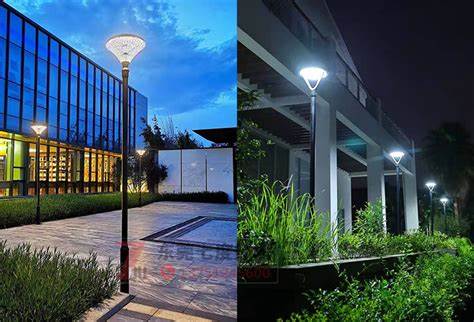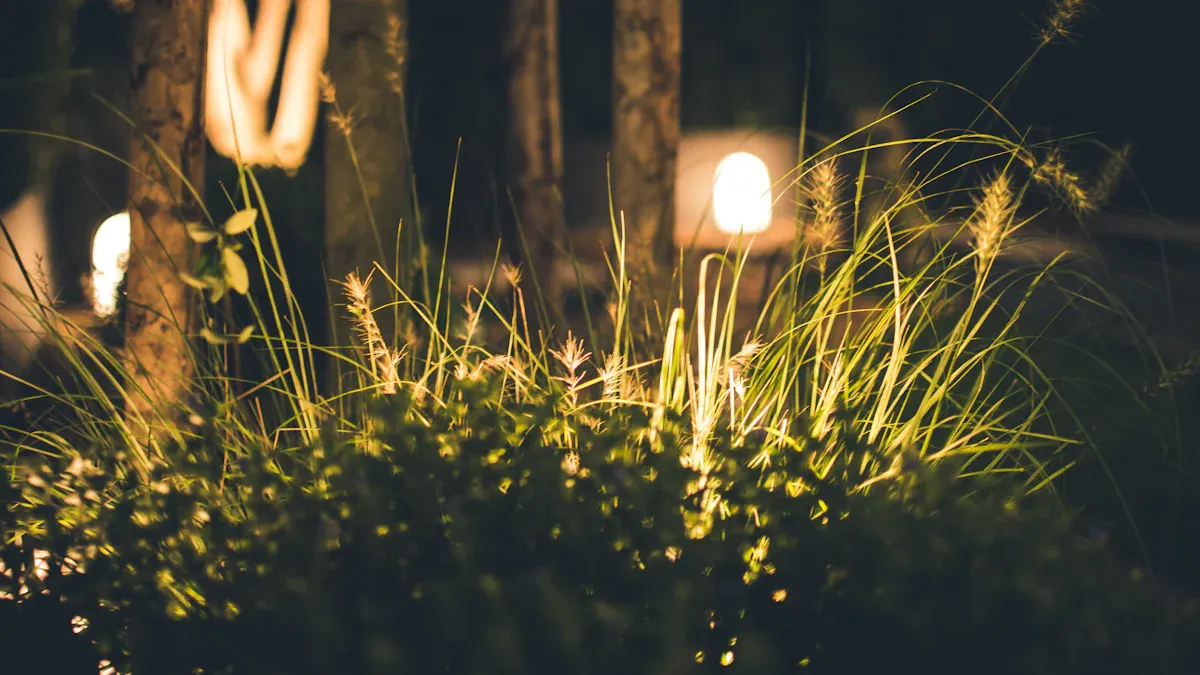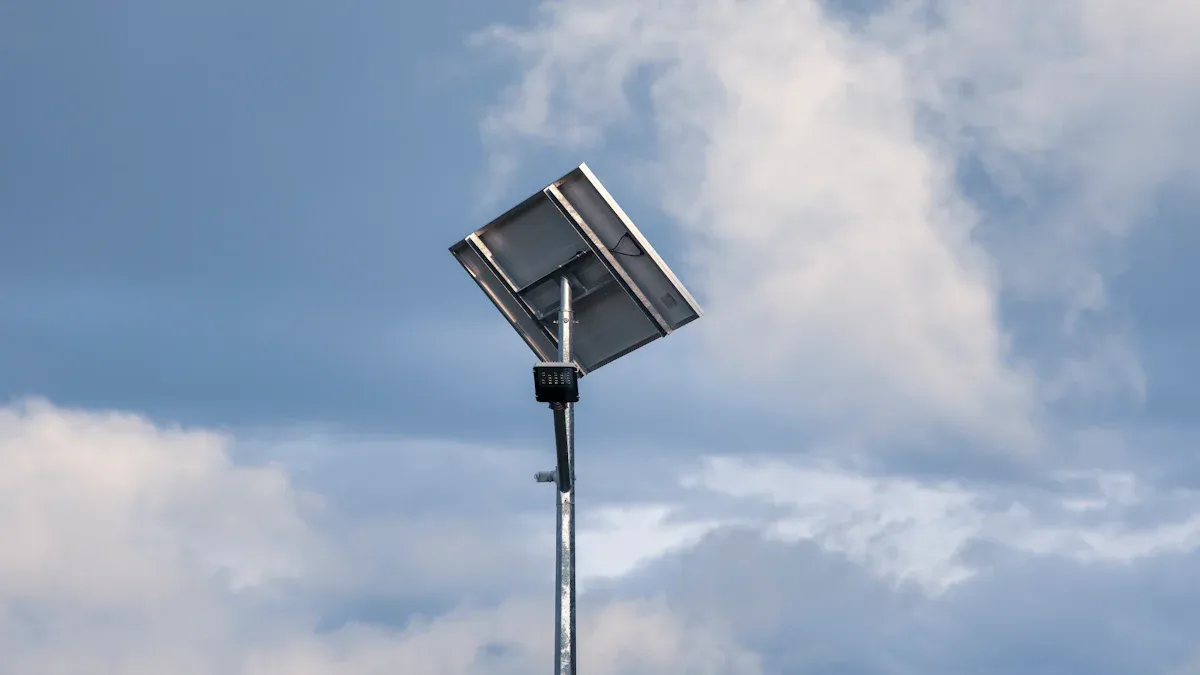How to Choose Reliable Solar Lights for Outdoor Use in 2025

When choosing a solar light for your yard, pick one that works in any weather. A good choice has strong solar panels, durable batteries, and tough materials. These parts help your lights stay bright and reliable. The outdoor solar LED market may reach $58.5 billion by 2030. This shows how important good performance is. Picking the right light saves energy and improves your yard. Whether for paths or patios, the right light matters a lot.
Key Takeaways
Pick solar lights with sturdy panels and long-lasting batteries for all-weather use.
Find lights with bright output to keep your outdoors safe and visible.
Choose lights made of strong materials like aluminum or steel to handle bad weather.
Look for good warranties and reviews to get a product that lasts.
Put solar lights in sunny areas to make them work better and shine brighter at night.
Understanding Solar Lights for Outdoor Use

Benefits of Solar Lights
Solar lights can change how you light your yard. They save energy and lower costs while brightening outdoor spaces. Cities like Seattle show their power. Seattle’s solar streetlights cut energy use by 75%. They also saved $850,000 yearly on maintenance. Imagine saving that much at home!
These lights use less energy than regular bulbs. LEDs make them super efficient. Some models have sensors to adjust brightness. This gives just the right light without wasting power. Switching to solar lights lowers bills and helps the planet. Each light stops up to 2 tons of CO2 emissions yearly. That’s good for your wallet and the Earth.
Types of Solar Lights for Yard
Solar lights come in many types for outdoor use. Each type has a special job. You can mix them to fit your yard perfectly.
Pathway Lights
Pathway lights guide you at night. They’re small, stylish, and easy to set up. Use them along walkways or driveways. They make your yard safer and prettier.
Floodlights
Floodlights are bright and great for security. They light up big areas like backyards or driveways. Choose these if you need strong, wide lighting.
Decorative Lights
Decorative lights add beauty to your yard. Use them for parties or relaxing outside. They come in fun shapes and colors to match your style.
Motion-Sensor Lights
Motion-sensor lights are smart for security. They turn on when they sense movement. This saves energy and keeps your yard safe. These lights are both useful and protective.
Evaluating High-Quality Solar Lights
Solar Panel Efficiency
Monocrystalline vs. Polycrystalline Panels
The type of solar panel affects how well it works. Monocrystalline panels are better at turning sunlight into power. They’re great for places with less sun. Polycrystalline panels don’t work as well but cost less. If your yard gets lots of sun, these are a good choice.
Metric | Description | Importance |
|---|---|---|
Shows how much energy the panel makes in good sunlight. | Higher efficiency means more power, even in cloudy weather. |
Importance of Sunlight Exposure
To make solar lights work best, put them in sunny spots. Avoid placing them under trees or near walls. More sunlight means brighter lights at night. This helps them last longer and shine better.
Battery Capacity and Longevity
Lithium-Ion vs. NiMH Batteries
The battery is what keeps your solar light running. Lithium-ion batteries are the best choice. They hold more energy and last longer than NiMH batteries. If you want lights to stay on all night, pick lithium-ion.
A battery’s capacity, in watt-hours (Wh), shows how long it can power the light.
Bigger batteries are better for places with less sunlight.
Recharge Time and Run Time
Good batteries charge fast and stay on for hours. Look for lights that charge in 6-8 hours and run for at least 10 hours. Tests show lithium-ion batteries last longer, making them a smart pick.
Brightness and Lumens
Measuring Brightness
Lumens tell you how bright a light is. For example, pathway lights need 10-200 lumens. Security lights need over 1,000 lumens. Always check lumens to match the light’s brightness to your needs.
Type of Solar Light | Lumen Output Range | Application |
|---|---|---|
Solar Path Light | Soft lighting for paths | |
Tactical/Security Light | > 1,000 lumens | Bright light for safety |
LED Garden Light | 800 lumens | Perfect for garden paths |
Matching Lumens to Outdoor Needs
Think about where you’ll use the lights. Pathways need fewer lumens for a soft glow. Security lights need more lumens for clear visibility. The right brightness can make your yard look amazing.
Build Quality and Durability
Materials and IP Ratings
Pick solar lights made from strong materials. Aluminum and steel are great choices. They can handle rain, snow, and dust easily. Plastic lights are cheaper but break faster over time.
Check the IP rating of the lights too. This tells you how well they resist water and dust. For example, an IP65 rating means it can handle heavy rain and block dust. This makes it perfect for outdoor use.
Strong materials like aluminum or steel make solar lights last longer. They can survive tough weather like rain, snow, and dust.
Look for IP ratings like IP65. These show the light is safe from water and dust, making it great for outdoor use.
Resistance to Weather Conditions
Outdoor solar lights face all kinds of weather. They need to work in hot summers and freezing winters. Lights with strong materials and good IP ratings can handle these challenges. If you live in a place with extreme weather, buy durable lights. They’ll last longer and save you money.
Durable solar lights save money by lasting longer and needing fewer replacements.
Warranty and Customer Support
Importance of a Reliable Warranty
A good warranty protects your purchase. It shows the company trusts its product. Look for warranties that last one or two years. This way, you’re covered if something breaks. A strong warranty often means the product is high quality.
Evaluating Customer Reviews
Customer reviews can help you choose the right lights. Check if people are happy with the warranty and support. Did the company fix problems quickly? Did they honor the warranty? These reviews can help you avoid bad brands.
98% of LG solar panel owners are happy with their product.
About 70% say the product exceeded their expectations.
Good performance, strong warranties, and helpful installers make customers satisfied.
Strong warranties and good support build trust with buyers.
Bad warranty terms can upset customers.
Clear warranty rules help buyers feel secure.
Choose lights with good warranties and reviews. You’ll feel confident knowing you bought a reliable product.
Practical Tips to Buy Good Solar Lights
Matching Lights to Outdoor Decor
Picking Styles and Colors
Think about how solar lights match your yard. Do you like modern or rustic designs? Solar lights come in many styles to fit your space. Warm-colored lights feel cozy, while cool ones look modern. Check kelvin ratings to pick the right color tone. A matching design makes your yard look neat and welcoming.
Mixing Style with Usefulness
Style is nice, but lights must work well too. Pretty lights are useless if they don’t perform. Choose lights with features like motion sensors or brightness settings. Pathway lights can make your yard safer and prettier. By mixing style and usefulness, you get great results.
Focusing on Quality and Strength
Strong Materials
Outdoor lights face tough weather, so they need to be strong. Pick lights made of aluminum or steel. These materials handle rain, wind, and sun better than plastic. Strong lights last longer and save money over time.
Factor | Why It Matters |
|---|---|
Affects how well the lights work and last. | |
Battery Capacity | Ensures lights stay on longer, even in bad weather. |
Manufacturer Reputation | Shows if the brand is trusted and reliable. |
Features of Durable Lights
Good solar lights have replaceable batteries and long warranties. These show the company trusts their product. Look for IP65 ratings, which mean the light resists water and dust. These features help lights last through all seasons.
Thinking About Energy Savings
Green Features
Solar lights help the planet by saving energy. Many have eco-friendly modes and sensors to adjust brightness. These features save power without lowering performance. For example, San Diego cut energy costs by 60% using solar lights.
Using Solar Power Wisely
Place solar lights where they get lots of sunlight. Avoid shady spots under trees or walls. Also, check kelvin ratings to match the light’s color to your needs. Smart placement and choices make lights more efficient and improve your yard.
Installation and Maintenance of Solar Lights

Proper Installation for Best Results
Placing for Maximum Sunlight
To make your solar lights work well, put them in sunny spots. Pick areas with lots of sunlight and little shade. Southern-facing spots often get the most sun. Avoid placing lights under trees, near walls, or where debris gathers. If branches block sunlight, trim them or move the lights. More sunlight means brighter lights that last longer at night.
🌞 Tip: Sunlight is key for good performance. Even small shadows can lower energy production a lot.
Avoiding Installation Errors
Setting up solar lights seems simple, but mistakes can happen. Take your time to install them properly. Secure the lights tightly to avoid damage from wind or rain. Make sure they are weatherproof to protect the parts inside. If unsure, ask a professional for help. Correct installation boosts efficiency and makes the lights last longer.
Maintenance Tips for Long Use
Cleaning the Solar Panels
Dusty panels block sunlight and reduce power. Clean them often with a soft cloth or sponge. Don’t use harsh cleaners or rough materials that can scratch them. Wiping them every few weeks helps your lights work better.
Checking and Changing Batteries
Batteries power your solar lights. Over time, they may stop holding a charge. Check them if lights seem dim or don’t stay on long. Replace old batteries with good-quality ones. Lithium-ion batteries are strong and last longer.
Protecting Lights in Bad Weather
Solar lights face tough weather like rain and snow. Choose lights with a high IP rating, like IP65, to resist water and dust. During extreme weather, cover or remove the lights to keep them safe. Taking care of them helps them work all year.
🛠️ Note: Simple tasks like cleaning and battery checks can make your solar lights last longer and work better.
Picking the best solar light for your yard is easy. Look at things like panel efficiency, battery strength, and toughness. These features make lights work better and last longer. They also save energy and cut down pollution. Did you know one solar streetlight can stop 2 tons of CO2 each year? That’s great for the planet and saves you money too.
Learn the basics, use helpful tips, and take care of your lights. This way, you’ll have bright, energy-saving lights you can trust. Choose wisely today and make your yard shine with solar lights that work hard for you.
FAQ
How long do solar lights last?
Solar lights usually last 3-5 years before replacement. Batteries might need changing every 1-2 years. Cleaning panels and checking batteries often can make them last longer.
Can solar lights work in shaded areas?
Solar lights need sunlight to charge fully. They can work in shade but will be dimmer and run less time. For best results, place them in sunny spots during the day.
Are solar lights waterproof?
Yes, most outdoor solar lights are waterproof. Look for an IP65 rating or higher to ensure they handle rain well. Always read the product details before buying.
Do solar lights work during winter?
Solar lights work in winter but may not last as long at night. Less sunlight means shorter run times. Pick lights with strong batteries and good panels for better winter use.
How do I maintain my solar lights?
Clean the panels often to remove dirt and dust. Check batteries and replace them if needed. During bad weather, cover or bring the lights inside to protect them.

